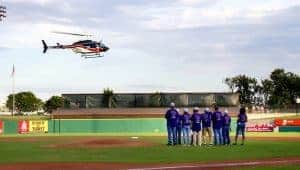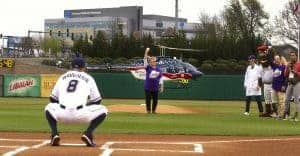Strike Out Stroke Nights Grow as AR SAVES Does
| May 16, 2018 | As AR SAVES (Arkansas Stroke Assistance through Virtual Emergency Support) marks its 10th year of operation, the total number of stroke survivors and their families helped by the program expands too, bringing more and more of them to the ballpark for Strike Out Stroke nights.

Stroke survivors wait on the baseball diamond at Dickey-Stephens Park as the helicopter prepares to land in the outfield and deliver the Strike Out Stroke baseballs for them to throw.
It was the eighth year AR SAVES organized Strike Out Stroke game nights at Arvest Park in Springdale in April and at Dickey-Stephens Park in North Little Rock in May to raise awareness of stroke and educate the public about stroke symptoms and risk.
Before the North Little Rock game May 10, a helicopter brought stroke neurologist Krishna Nalleballe, M.D., to deliver baseballs for the game’s first-pitch ceremony, all strikes against stroke.
In Springdale on April 5, another helicopter transported Washington Regional Medical Center neurologist Margaret Tremwel, M.D., to Arvest Park to do the same thing. AR SAVES stroke survivors were honored at all the games serving as a reminder to others that getting to the hospital quickly can prevent stroke death and disability.
Stroke survivors at the ballparks threw first strikes before the baseball games, and other stroke survivors were recognized on the fields as well.
To help Arkansans learn how to survive stroke, AR SAVES leadership, staff, volunteers and community partners organize and are a part of dozens of events throughout the year, including “Strike Out Stroke” nights.
“More and more survivors and families turn out to support AR SAVES and be recognized themselves,” said Renee Joiner, director of AR SAVES. “We’ve outgrown the skybox and now have to host the families in one of the park pavilions at Dickey-Stephens.

The helicopter takes off from Arvest Park in Springdale after delivering the baseball that stroke survivor Linda Williamson holds up near the pitcher’s mound.
“Strike Out Stroke Nights are just one of the many types of events we continue to use to appeal to different audiences with the goal of educating the public about how to recognize stroke symptoms and get timely treatment.”
AR SAVES uses a high-speed video communications system to help provide immediate, life-saving treatments to stroke patients 24 hours a day. The real-time video communication enables a stroke neurologist to evaluate whether emergency room physicians should use a clot-busting blood thinner within the critical three-hour period following the first signs of stroke.
Arkansas ranks sixth in the nation in stroke death rates. Surviving a stroke is becoming more likely as more community hospitals join the SAVES network.
